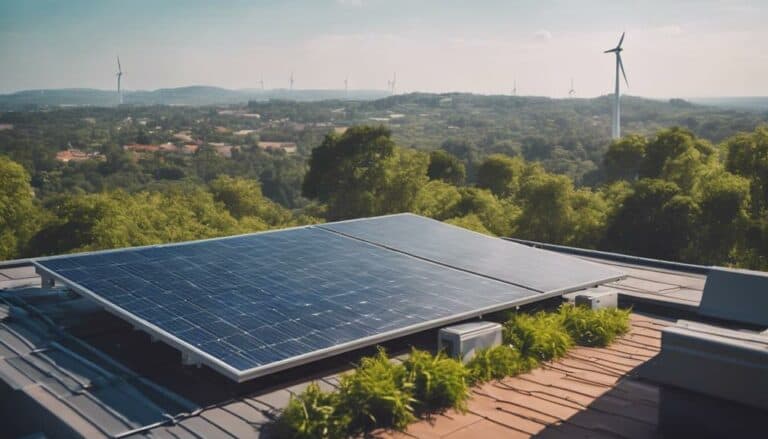Embrace innovative tech like solar power, electric vehicles, and advanced analytics to bolster sustainable practices. Solar energy's cost-effectiveness is key, comprising 82% of new global electricity capacity. Electric vehicles cut emissions, while IoT devices enhance environmental monitoring precision. Machine learning predicts extreme weather events accurately and optimizes energy usage. These solutions collectively combat climate change, supporting a greener future.
Key Takeaways
- Solar power reduces greenhouse gas emissions and is cost-effective.
- Electric vehicles in smart transportation lower emissions.
- Advanced analytics optimize agriculture practices and reduce resource wastage.
- IoT devices monitor environmental changes with precision and efficiency.
- Machine learning enhances climate action by predicting extreme weather events.
Renewable Energy Solutions
In the domain of sustainable energy practices, the integration of renewable energy solutions has become essential for reducing carbon emissions and fostering a greener future. Solar power, accounting for 82% of new global electricity capacity, stands out due to decreasing panel costs driving its rapid growth. This renewable energy source not only offers a clean energy alternative but also contributes greatly to reducing greenhouse gas emissions.
Wind power, another cost-effective renewable energy source, plays an important role in expanding new electricity capacity worldwide. Additionally, hydroelectric power, widely utilized in countries like China and Brazil, helps meet high consumption rates sustainably.
The global goal of reducing greenhouse gas emissions by nearly half by 2030 necessitates the adoption of renewable energy sources like solar and wind power. Moreover, the shift towards these sustainable energy sources is essential for a sustainable future, with microgrids emerging as a promising solution to enhance energy production efficiency and decrease carbon emissions.
Smart Transportation Systems
Smart transportation systems leverage technology to optimize efficiency, reduce emissions, and enhance sustainable mobility options. Electric vehicles play an important role in these systems, markedly lowering greenhouse gas emissions compared to traditional vehicles.
Integrating ride-sharing platforms into smart transportation systems helps maximize vehicle utilization, decreasing the number of cars on the road and alleviating traffic congestion. Advanced traffic management systems further improve efficiency by utilizing real-time data to streamline traffic flow and reduce delays.
Digital technologies are revolutionizing urban mobility, paving the way for a more sustainable future where transportation is cleaner and more efficient. By reducing emissions and combating traffic congestion, smart transportation systems are at the forefront of utilizing technology to create environmentally friendly and effective transportation solutions for the modern world.
Embracing these innovations is essential for building a greener, more sustainable transportation infrastructure.
Advanced Analytics for Agriculture
Utilizing advanced analytics in agriculture maximizes crop yields by analyzing soil health, weather patterns, and plant growth data to inform sustainable farming practices. By harnessing machine learning algorithms, farmers can process vast datasets to predict best planting times, disease outbreaks, and yield projections. This data-driven approach empowers farmers to make informed decisions regarding irrigation, fertilization, and pest control, ultimately reducing resource wastage and environmental impact through precision agriculture techniques.
Integration of IoT devices and sensors further enhances these capabilities, enabling real-time monitoring and management of crop conditions. This synergy of advanced analytics and technology not only increases productivity but also fosters a more sustainable agricultural ecosystem. Embracing these innovations allows for more efficient use of resources, lower environmental impact, and ultimately better outcomes for both farmers and the environment.
- Enhanced crop yield maximization through data analysis
- Predictive insights for planting, disease control, and yield forecasting
- Reduction in resource wastage and environmental impact
- Real-time monitoring and management of crop conditions
IoT Devices for Environmental Monitoring
IoT devices revolutionize environmental monitoring by enabling real-time collection and transmission of data on air quality, water quality, and temperature for analysis and decision-making. These devices play a vital role in early detection of pollution incidents and natural disasters.
By facilitating precision and accuracy in monitoring environmental changes and trends, IoT technology enhances resource management and conservation efforts. The integration of IoT devices in environmental monitoring systems allows for proactive measures to be taken in response to fluctuations in air quality, water quality, and temperature.
Through continuous monitoring, these devices provide valuable insights that aid in the protection of ecosystems and the mitigation of environmental risks. Leveraging IoT devices for environmental monitoring not only helps in safeguarding the environment but also contributes to sustainable practices by promoting efficient allocation of resources and informed decision-making processes.
Machine Learning for Climate Action
Machine learning algorithms revolutionize climate action by analyzing data to predict extreme weather events with increased accuracy. These algorithms are instrumental in understanding climate patterns and trends, offering valuable insights into the dynamics of our changing climate.
Additionally, machine learning tools can optimize energy usage across various sectors, consequently reducing carbon emissions and promoting sustainable practices. AI-driven climate action platforms serve as hubs for collaboration among stakeholders, including researchers, policymakers, and activists, fostering a collective effort towards combating climate change.
In addition, machine learning plays a pivotal role in identifying and mitigating the impacts of climate change on ecosystems and wildlife, aiding in the preservation of biodiversity. By harnessing the power of machine learning, we can enhance our understanding of climate dynamics, optimize resource management, and work towards a more sustainable future for all.
Conclusion
To sum up, the use of technology to enhance sustainable practices is vital in addressing environmental challenges. With renewable energy solutions, smart transportation systems, advanced analytics for agriculture, IoT devices for environmental monitoring, and machine learning for climate action, we can make significant progress towards a greener future.
Did you know that by 2030, it's projected that global renewable energy capacity will reach over 2,000 gigawatts, representing a significant shift towards cleaner energy sources? This statistic highlights the potential impact of technology in promoting sustainability.

